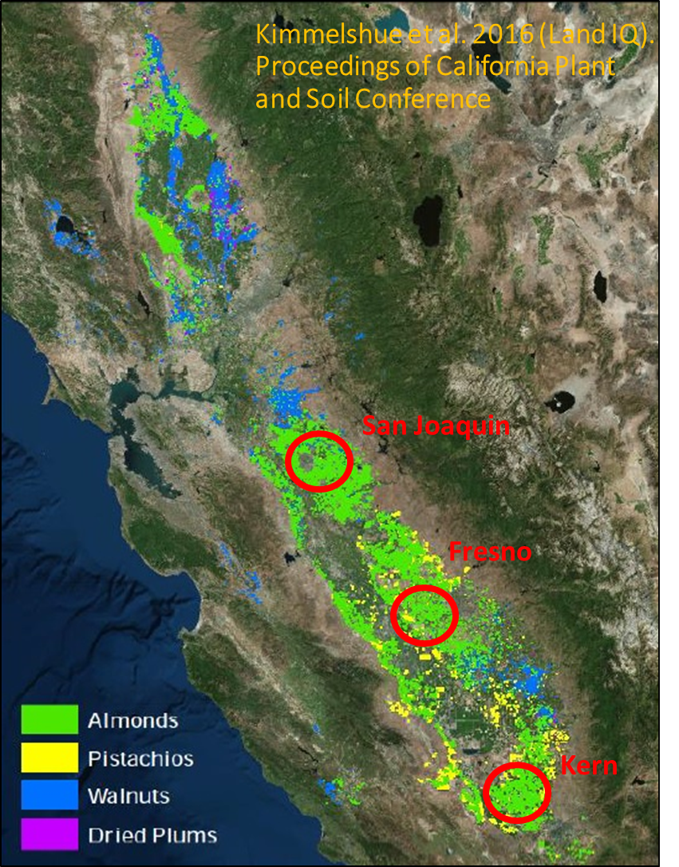
Toward understanding the effects of whole orchard recycling (WOR) under different representative orchard conditions, this project established research sites in several locations across California. These sites have differing soil types, rainfall and weather conditions, and orchard management practices. In addition to three primary research sites described here, a number of private growers have partnered with this project to host research trials examining certain aspects of WOR.
UC Kearney Research and Extension Center, Parlier, Fresno County
The Kearney Research and Extension Center is one of nine UC Agriculture and Natural Resources research and extension centers in California. In 2008, an experimental stone fruit orchard was recycled and replanted in almond in a randomized block experiment with two main treatments and 7 replications:
- whole tree grinding and incorporation into the soil with the ‘Iron Wolf,’ a 50-ton rototiller
- tree pushing, burning, and ash spreading
Three varieties (Nonpareil, Butte, Carmel) on Nemaguard rootstock were planted in February 2009. Nine years later, UC researchers are able to examine the long-term effects of WOR on many aspects of soil health, tree health, and orchard productivity and management.
Wonderful Orchards, Bakersfield, Kern County
The trial was established in Fall 2016 on a Wasco sandy loam site to compare factorial combinations of biomass management (WOR and complete tree removal) with strip fumigation, spot fumigation, and anaerobic soil disinfestation. The trial was established with 6 replicated main plots in randomized complete block design. Each main plot (WOR or tree removal) contains four subplots with the following treatments.
- non-fumigated control
- strip fumigation (Telone C35 applied in 50% row strips at 540 lb/treated acre)
- spot fumigation (Telone C35 applied in 16% planting spot zones)
- anaerobic soil disinfestation (ASD) with various substrates
In WOR plots, wood chips were incorporated in the cleared land at the same rate the trees were removed (63 tons/acre). Soils were inoculated with Pythium ultimum, a contributor to prunus replant disease, prior to all treatments. Inoculum survival rates were measured prior to replanting the orchard, and tree growth and health monitored throughout the trial.
Tallerico Farms, Manteca, San Joaquin County
This trial was established in February 2017 on a Veritas fine sandy loam site in Manteca to study effects of WOR treatment on soil health parameters and tree health and growth compared to when the whole biomass is exported from the field. The experiment was designed as a randomized complete block design with four replications of two main treatments:
- Whole tree chipping with a tub grinder (4 to 6”) - surface spreading and incorporating within top soil (6 inches). The woodchip application rate was 64 tons per acre.
- Removal of aboveground biomass (Control)
Following wood chip spreading, the ground was ripped and each tree site was excavated before being spot fumigated with Telone C35 (Fall 2016).